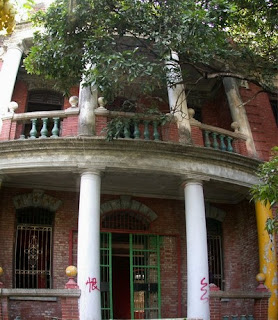Showing posts with label culture. Show all posts
Showing posts with label culture. Show all posts
1 November 2010
Physical Exercise and Parkour
From my point of view I would have to say people in China, including the elderly, are more keen on fitness than many of their western counterparts. Physical education in school and the overall mentality of the culture really seems to give some legitimacy to the importance of having an active lifestyle. I could probably walk through any park in Hong Kong or Guangzhou in the morning or afternoon and find children, parents or the elderly engaged in some form of simple exercise.
Numerous facilities in Hong Kong offer working men and women an assortment of activities to choose from, everything from yoga, Latin dance, football (the beautiful game), badminton and the list goes on. However, interest in yoga has seen a steep decline since the beginning of the year.
But today while I was riding the MTR, I noticed an advertisement for a sport I had never witnessed in Hong Kong called parkour. I had heard of parkour before and have seen it performed gracefully by French practitioners.
Then it got me to thinking about space restrictions here in the city and that how even pedestrians are somewhat limited in their movement, especially given the day-to-day construction. Personally I find parkour an exciting sport (if it's acceptable to call it that), but wonder if enough room exists in our urban environment to accommodate parkour enthusiasts.
31 October 2010
The Halloween Post
 |
| Nam Koo Terrace |
According to many locals in Hong Kong, the pictured mansion is an authentic haunt of spirits. Just looking at the exterior of this old mansion causes the imagination to run wild. While it's true that the Chinese generally tend to lean toward belief in superstition, I have a healthy respect for any place that elevates the myth of urban legend to something more real and terrifying.
Several years ago, a group of young students wanted to stay overnight in that mansion in an attempt to see ghosts they believed haunted the rooms. According to reports published in the local papers, events did not go as planned for the young ghost hunters. At some point in the evening, the students decided they had had enough and wanted to leave. They made their way to the gated entrance when suddenly the girls in the group began growing agitated, became emotionally distressed and appeared to lose control of their own bodies.
Two police officers patrolling Ship Street that evening saw the group and noticed the commotion. The officers investigated, offering their assistance. The reports say that when the officers attempted to restrain the girls, who by now had grown aggressive, the officers required the support of additional officers at the scene. It took the efforts of everyone assembled at the gate of the mansion to physically restrain the female students. The troubled students were finally subdued and sent to a hospital for psychiatric evaluation.
Today, the former Japanese brothel still stands on Ship Street in Wan Chai, desolate, save for the feral cats who call it home, haunted by the spirits of deceased comfort women.
True story?
The New Social Classes
 |
| The reformer |
Deng Xiaoping is credited with proclaiming to the people "to be rich is glorious". Apart from the market reforms of the 70s, other meaningful reforms never materialized. While many government officials and their families have benefited immensely from the nation's expanding economy, many have been left behind to fend for themselves in a system that is highly preferential to the wealthy.The most recent example I have heard of involved several company CEOs and managers in Shanghai receiving government subsidies for private housing.
Government attempts to cool the housing market have fizzled, graft continues unabated, GDP is viewed by cadres in all provinces as the holy grail which they are to chase after at all costs and the mantra 'more, more, more' can be heard from many officials who display insatiable appetites for greater material wealth.
Though Deng's reforms have succeeded in spreading around some of the wealth flowing into the country, its overall success has been limited due to graft at the national, provincial and municipal levels. As a result, this has contributed to a growing number of instances of social injustice. One of the most recent examples is the now infamous incident at Hebei University.
This has given rise to a dichotomy that I have termed The Resented and The Resentful. These two social classes are distinctly opposed to one another. A modern illustration of these two subclasses would be a princeling and the general public. A princeling is resented for their arrogance and belief that they are above the law while the public are resentful over the perceived sense of injustice from the son or daughter of an official.
While the western version would be similar to The Haves and The Have Nots, I don't believe this western classification applies because while both rich and non-rich Americans are busy chasing after the American dream, many Chinese strive for simple justice from their courts and elected officials.
Subscribe to:
Posts (Atom)
